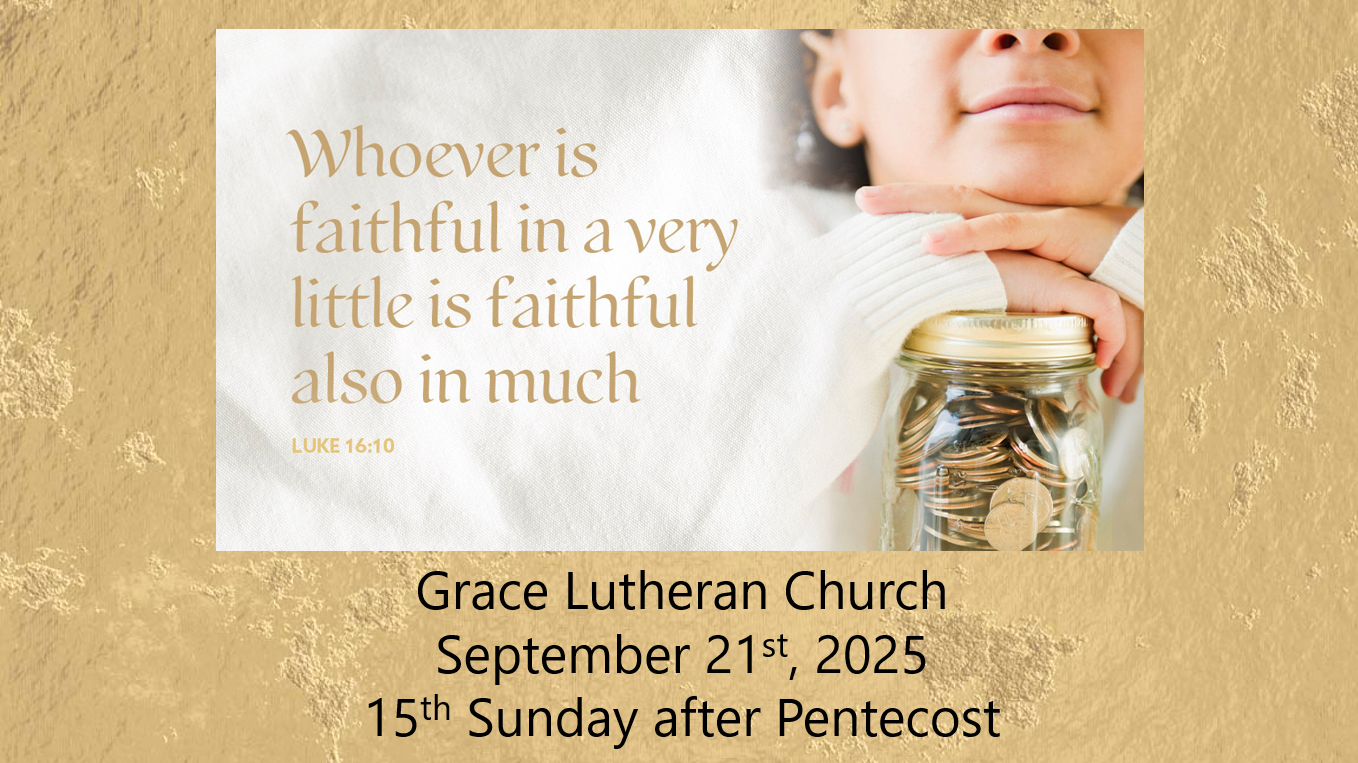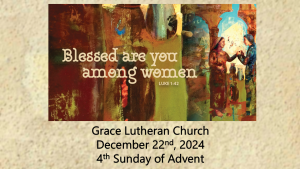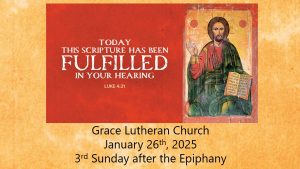Hi everyone,
Welcome to worship for this 15th Sunday after Pentecost, which lands on September 21, 2025!
The bulletin for this service can be found here, and it includes the order and words for worship as well as the full sermon manuscript. You can use it to follow along with the service or you can just use the words that will appear on your screen. The sermon is also on this page below the video.
For a fuller online worship experience, you can have a candle in your space, lit for most of the service until it is extinguished near the end after the sending hymn. You are also welcome to participate in communion if you are comfortable, by having something small to eat and drink prepared for consumption. Further instruction will be given at the appropriate time.
May God’s loving grace and mercy fill you with peace and truth, this day and always!
Saving God, by your Spirit may we faithfully hear your Word calling us into your community, full of grace and mercy, through Jesus Christ. Amen.
So let me get this straight…
In the gospel lesson that we just heard, Jesus tells a parable about this rich guy who is about to fire the manager of his property because he heard a rumour that the manager wasn’t doing a very good job. “Squandering” was the word used, and I guess that sounds like a fireable offense. This of course sends the manager in a bit of distress as he faces his impending unemployment, so to save his own skin he decides to further mismanage the property in order to get people on his side, by cutting the debts they owe his boss by up to 50%. But the kicker is when the rich guy catches wind of what the manager did, he doesn’t get madder or anything, but rather he goes and hires that manager back. And not even so he can fire him again for slashing his prices, but the rich man actually honours this manager and praises him for his good work.
The heck?
Now I should say that I’m not super well versed in business or managing property or even how to be rich, but keeping someone on the payroll who costs you money seems to me like a really bad practice. Again, I don’t know much, but I know the difference between an asset and a liability, and this manager totally sounds like a liability.
So how does this make any sense? How can a rich man be happy when he’s making less profit and even thanks the guy who was behind the loss? This just doesn’t sound like something that should ever happen, let alone taught about and praised. We can see how it’s not fair, how it’s not right, how it’s almost wrong for Jesus to even say it.
And if Jesus is wrong about this, then what else could he be wrong about?
Now before you fire me for being a heretic for calling Jesus out like this, I should say that I actually don’t think Jesus is wrong here. And before you fire me for thinking that we should be honoured for ripping off our bosses, I don’t think that either. Confusing, I know. But I don’t think Jesus or the parable is the problem here. Rather, I think it’s us.
Us and this slew of assumptions we hold onto.
Sure, we might say that our assumptions are more like educated guesses, but at their core, they are still assumptions. Like when we heard “rich man” didn’t we automatically think about a greedy, exploitive, and pretentious person who only got rich off the backs of the working class? And when we heard “manager” didn’t we think that he was a hard worker who was fired unjustly? And then when he started slashing prices, didn’t we think he did it out of a vindictive attitude to get back at his boss?
I know I did. And that’s why this parable was so confusing to me. In that light it doesn’t sound like a lesson I’d want to learn or teach my kids or any of you for that matter. But when we look at the parable again and try to suspend those assumptions, we see that Jesus doesn’t say any of those things at all. In fact, this story doesn’t give us much detail about anything at all. So let me propose a flip in this story, a change in paradigm, a slight shift in how we see these main actors and thus how we can interpret Jesus’ words here.
Like, what if the rich man wasn’t a mean old Ebeneezer but actually kind and benevolent? What if he was responsible in how he ran his property and provided good, meaningful work, fair wages, and a place of community for those under his employ? And what if the rumours about the manager were true and he mismanaged by paying the workers less, padding the invoices, and skimming off the till? Like what if he was actually corrupt and his boss caught him and that is why he was getting fired?
And then, maybe this was the wake up call the manager needed and he saw the error of his ways, saw how his actions were burning bridges rather than building them, and he wasn’t representing his boss’ kindness in how he did his job. And so when he cut the debts, maybe he wasn’t getting back at his boss at all, but rather he was asking for exactly what they owed minus his own self-imposed tax.
So maybe the rich man didn’t commend the manager for stealing from him, but for no longer stealing from others in his name.
And so Jesus’ commentary on this, about how the children of this age are more shrewd, is comparing how the world conditions us to look out only for ourselves and take advantage of the morally gray opportunities as long as it benefits us, to how God teaches us to be compassionate, gracious, and merciful. So Jesus wasn’t teaching us to be more shrewd but to be more considerate, not more individualistic but more relational, not more divided but more supportive of each other in community and love.
I know, really different from our initial assessment based on our assumptions, right? But to me, makes much more sense, tracks much more with what Jesus is about, and is actually good news in revealing to us who we are, who we’re called to be, and how we can participate in making this world a better place.
And I can’t help but wonder, what else do we make assumptions about? How else do we miss what God is saying to us? How do our set and strict opinions and paradigms reshape our feelings of others, ourselves, and how God should act and react in who is condemned and who is saved?
Last week we talked about a certain death that happened in the States, and how it drove further the wedge between people and brought more division than anything else. This event gave both sides more ammo, more reasons to blame the other, more justification to hate. And now in the event’s aftermath, there continues to be so much conjecture, speculation, and assumption. I admit that I followed a lot of it on social media, and from what I could tell all the posts, comments, and rants from both sides had very little evidence to back them up. I just saw more generalizing and scapegoating. It was like every opinion that I saw, every interpretation, every take on the situation came from the premise that the other side was plain wrong. That was their starting point. It was on that assumption that all their arguments were based on.
But what if we changed that narrative instead? What if we shifted that paradigm? What if rather than just automatically assuming the other side is bad, we assume they’re good? I’m not saying that we should pretend that evil doesn’t exist or that we should just ignore it, but I’m wondering what would happen and how could the world change if we just gave the benefit of the doubt before jumping to conclusions? What if we looked at the differences of opinion with open minds rather than already deciding that we can’t learn anything from those we dislike and disagree with? What if we choose to love over hate?
Then maybe we would be able to see the good in people, even if we still think they’re misguided. Maybe our hard feelings toward those we don’t agree with will soften a little and we start to understand them a bit more instead of shutting them out completely. Maybe, just maybe, we will be able to recognise God working in them and in us, raising up all people to be the body of Christ, proclaiming grace and peace in the midst of a divided world.
I mean, isn’t that a better way to live? Wouldn’t that more allow us to feel God’s presence among us? Don’t you think that this is what God wants for us, created us to be, even died for? That we could understand and grasp just how loved and forgiven and saved we are?
See our God isn’t a God of division and besting the other. Our God isn’t one of war and political power. Our God isn’t even about shrewd managing of our resources and assumptions. Rather, our God is about the grace in welcoming those who are different, those with whom we don’t agree, and even those who hurt us. Our God is about the joy in seeing the beauty in each other, in diversity, and in the community in which we all belong. Our God is about the benevolent love that includes, forgives, and reveals to us all truth, wisdom, and discernment.
So in this season after Pentecost, may we continue to strive in our recognition of God in the world, building bridges and tearing down walls, that we might see each other not just as right or wrong, but as loved and forgiven and included in the body of Christ. Thanks be to God. Amen.




